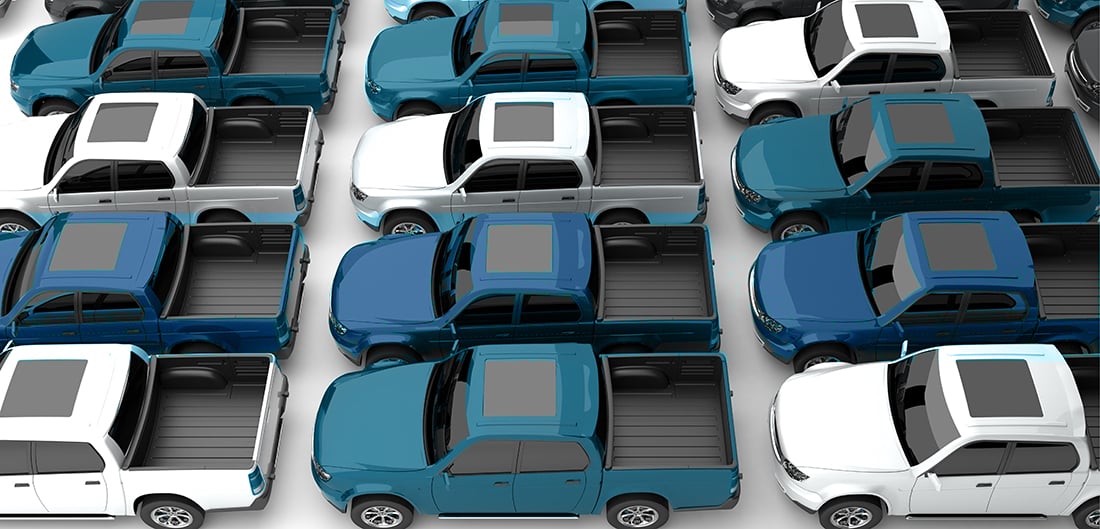What do America’s two best-selling vehicles have in common? They’re pickup trucks.
It’s no secret that drivers have long had an affinity for trucks. But as automakers refine the ride and handling of pickups, more drivers are starting to see them as more versatile everyday rides.
But it’s this versatility that makes shopping for a pickup much different—and more difficult—than shopping for a car. So how do you find the truck that’s right for you?
Always start with an honest evaluation of how you plan to use your new truck. Then, choose the options that will best meet those needs. (And don’t forget the auto insurance.)
What to Look for When Buying a Truck
Here are some important factors to consider when searching for your perfect truck.
- Full-size, mid-size or compact: The first element you should explore is how large of a vehicle you really need. If you use your truck for work or to tow a boat or camper, you’ll probably benefit from the power of a Ford F-150, Chevy Silverado, Dodge Ram or other full-size pickup. If you don’t plan to tow or haul heavy loads on a regular basis, mid-size trucks, such as the Chevy Colorado, Toyota Tacoma and Ford Ranger may be the best choice. If you don’t have plans for much towing at all, but want the added utility of a truck bed, consider a compact truck like the Ford Maverick or Hyundai Santa Cruz. These mini trucks are growing in popularity thanks to their car-like driving dynamics and great fuel economy.
- Cab and bed size: Next, determine how much space you need both inside and out. Most truck cabs are available in regular (two doors, no back seat), extended (two or four doors, small back seat) and crew (four doors, large back seat). Pickup bed options include short (about 5 feet), regular (about 6.5 feet) and long (about 8 feet). Meanwhile, compact trucks feature a small bed size of about 4 feet and are only available with four doors. Keep in mind that when it comes to cab and bed sizes, more space is typically accompanied by a higher price tag.
- Gas, diesel, hybrid or electric: In today’s market, there are more fuel options than ever before. Diesel engines are a great choice if torque and towing are a priority. They typically last longer than gas engines and get better fuel economy – but come with a higher price tag. Traditional gas engines are great for daily driving because of their lower purchase and maintenance costs. Want to save on fuel costs? Ford, Toyota and Ram all have hybrid engine options available. Or you can go all electric with a plug-in truck like the Ford Lightning or Rivian R1T.
- Drivetrain: When it comes to gas pickups, most are available with four-, six- and eight-cylinder engines. They also come with the choice of two- or four-wheel drive. When choosing an engine, you’ll need to balance the trade-offs between price, horsepower and fuel economy. And if you often find yourself driving in winter weather or off-road conditions, four-wheel drive is probably a wise choice.
- Hauling and towing: All pickup trucks are capable of carrying heavy loads and hauling a trailer. Knowing how much weight you need to move will help determine whether you need a light- or heavy-duty truck. For example, according to U.S. News, a new Ford F-150 can carry a payload of 3,310 pounds and tow 14,000 pounds. But with the more capable F-250, those numbers increase to 4,268 pounds and 22,000 pounds, respectively. The rule of thumb is to buy a truck capable of about 10% more power than you really need. Just keep in mind that bigger isn’t always better. If you buy a heavy-duty truck, expect to pay more at the pump and experience a harsher ride.
- ●Safety: When purchasing any new vehicle, safety ratings are always an important consideration. Be sure to do some research before driving your new truck off the lot. The Insurance Institute for Highway Safety (IIHS) conducts crash tests and other safety evaluations, such as headlight strength. Check out their large pickup vehicle ratings and small pickup vehicle ratings.
- ●Trim and options: Twenty-some years ago, optioning your pickup meant deciding whether you needed features like power locks and windows. But in today’s market, luxury features like infotainment systems, heated leather seats and even power tailgates are available to truck buyers. Just keep an eye on the final price tag as these options can inflate the price.
- ●New or used: There’s nothing quite like that new car smell. But with new truck prices ranging from $28,000 to more than $80,000 it might be worth letting someone else take the initial depreciation hit. Trucks are built to last, so purchasing a used model can still provide a reliable pickup at a fraction of the cost.
Wondering how insurance works when buying a new car? Read our related explainer: Is Your New Car Covered Under Your Auto Insurance Policy?
Insurance for New Trucks
While your new vehicle will lose some of its value the minute you drive it off the lot, that doesn’t mean your insurance coverage should take a hit, too.
Ask your local ERIE agent about adding the Auto Security endorsement to your auto quote. If your new car1 gets totaled, ERIE will pay you the cost to replace it with the newest comparable model year (minus your deductible). And if you’ve had your car longer than two years, ERIE will pay the cost to replace it with a comparable model that is up to two years newer, minus the deductible.
Learn more about auto insurance from ERIE or get a quote to see the ERIE difference for yourself.

